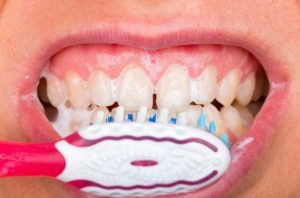
Some dental health issues are only obvious once you know you have them. Until then, the symptoms may not seem serious, especially if they don’t include pain in and around a tooth. For instance, if you notice a small amount of blood mixed in with your saliva when you brush and floss your teeth, you might not automatically assume that there’s a problem. However, bleeding gums may be an indication of one of the most serious oral health issues – gum disease.
Why Gums Bleed in the First Place
Your gums shouldn’t bleed, but when they do, they don’t typically hurt. The lack of discomfort can fool many people into believing that the condition is benign, or perhaps nothing more than the effects of brushing and flossing too hard. However, bleeding gums often indicate the development of gingivitis, the first stage of gum disease, which results from an infection in your gums caused by oral bacteria. Your gums may not hurt, but the bleeding could be the first of many more serious and uncomfortable conditions if you ignore it.
Could Flossing Be to Blame?
Many people want to blame flossing for their gums’ sensitivity, likely because they only notice their gums bleeding when they floss. However, flossing is rarely a cause of bleeding. The underlying cause is generally due to plaque bacteria buildup, the same substance responsible for creating dental cavities.
When plaque is allowed to remain in the mouth, due to poor dental hygiene or other mitigating factors, it can lead to irritation of the gums, which can eventually cause gum disease. Besides bleeding, other indicators of gum disease include visible inflammation, or redness or a dark purple coloring of the gums. Healthy gum tissue should be light pink in color!
How Can Gingivitis Be Treated?
The best course of action to reverse the symptoms of gingivitis is through a professional dental cleaning. If gingivitis has progressed, however, the dentist may recommend a periodontal cleaning in addition to a traditional dental cleaning.
A periodontal cleaning involves more deeply cleaning, particularly along the gumline, in order to remove the bacteria that can cause inflammation.
What Happens when You Ignore It?
The problem with gum disease is that it’s progressive. The longer it’s allowed to develop and progress, the more damage it will cause to your gums and underlying jawbone. If you ignore bleeding gums, then you might experience severe inflammation, recession of the tissues from your teeth, and in severe cases, loose or lost teeth. To avoid more serious consequences of gum disease, you should schedule an examination with your dentist as soon as you notice that your gums are bleeding or exhibiting any other signs of gingivitis.
Learn more about bleeding gums
If you notice that your gums are bleeding, then you should take the signs seriously and visit your dentist as soon as possible to check for gum disease. To learn more, schedule a consultation by calling Lake Forest Dental Arts in Lake Forest, IL, at 847-234-0517. We also proudly serve residents of Chicago and all surrounding communities in the Chicago Metro area.
